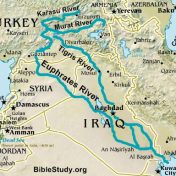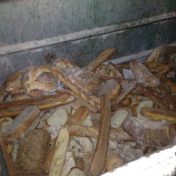(source: terrapass.com) The reality of fertilizer is that while it supports our food systems in the world, it can contribute even more to the pollution. The byproduct and the production itself of fertilizer contribute much to the carbon foot print of the world. The ecological condition that exists involves the climate impact of food and the overall function of the… Read more »
During the past few weeks, we have learned a lot of important concepts about where our food comes from and what we sacrifice in order to keep food on our tables. I found it very interesting and a bit daunting to learn about the amount of petroleum that it takes to make our mass production of food possible. Petroleum is… Read more »
Throughout lessons 5-7, we discussed varying topics from wide ranging areas of our world food system. Something that I could not shake off is the thought that many of the mistakes we have made as a society were encouraged by our leaders who were fully aware of what would result from their actions. For example, the Irish famine that was… Read more »
“Euphrates River Map.” Euphrates River Map, The Bible Study Site, www.biblestudy.org/maps/euphrates-river-valley-map.html. For me, the most interesting themes of this week revolved around water. I was surprised to find how much the political ecology of water can affect different groups. I think the common thought is that water is so plentiful that there is no reason for conflict or differing access to… Read more »
Kwak-Hefferan, Elisabeth. “Spoil Sport: How I Learned to Stop Worrying and Love the Dumpster.” Grist, 5 Nov. 2012, grist.org/food/spoil-sport-how-i-learned-to-stop-worrying-and-love-the-dumpster/. For me the most interesting topic discussed this week was the TED talk about food waste. It tied in well with other course work we have read. For example, Stuart in the talk asked the audience how many of them did not… Read more »
Lesson’s 8’s topic of water as a political entity was thought provoking, it also carried me back through the time I spent in Cambodia and Thailand. Riding down the Mekong in a rickety boat, hope it doesn’t flip….This week, it was mentioned that water can be a source of conflict, and power. In the example from the lesson, China built… Read more »
I had to reach back to a few weeks ago to remember what lesson 5 was about and then I remembered the Ted Talk by Tristram Stuart titled the Global food Waste Scandal. During his talk he put in perspective the amount of food that we actually do waste. I always knew that we wasted food as a country, but… Read more »
Tristram Stuart’s TedTalk The Global Food Waste Scandal reveals the global scale of food wasted and addresses the different ways to tackle food waste in the midst of growing world hunger. Stuart presents the unfortunate reality we live in and the responsibility we play in further perpetuating world hunger with the statistics indicating that with the surplus of food in… Read more »
In Lessons eight and nine we looked at water and food, both of which are vital aspects of living. More specifically we saw how different parts of the world have adapted to their climates so that they can accommodate their needs. Many countries have found ways to fix their deficits, such as Israel who went from being one of the… Read more »
In the past three weeks, we have looked at how big of a role economics plays in the food trade. From sugar becoming more than just a luxury good to being a staple in households to planting crops for a drug enterprise because it is the only way to keep families fed. Sugar being a staple is counter-intuitive because it… Read more »


